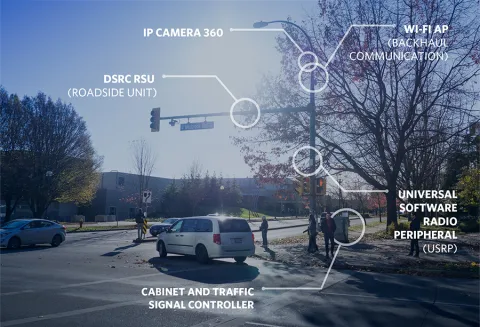UBC launches connected-vehicle test facility on campus

University of British Columbia researchers today unveiled a national test bed for connected-vehicle research as part of an initiative to promote safe, smart transportation in BC and beyond.
The facility, called AURORA, includes a network operations centre, a mobile base station and five intersections equipped with roadside units on the southeastern portion of UBC’s Vancouver campus. It also includes traffic cameras, software-defined radios, a smart traffic signal controller and two test drive vehicles, with all units connected to the campus network by wireless links.
“This launch marks the first step in enhancing information sharing between vehicles, infrastructure and pedestrians, to improve safety and get people to their destination more efficiently,” said lead researcher David G. Michelson, a professor of electrical and computer engineering at UBC’s Faculty of Applied Science. “With AURORA now open for research ventures and partnerships, academics, industry and government can collaborate in connected-vehicle research and testing in an integrated world-class facility right here at UBC.”
According to Michelson, the “smart intersections” on campus are now capable of communicating with connected vehicles, and the network will grow rapidly in terms of both size and capability with continued expansion planned for over the next year.
“When connected vehicles pass through these smart intersections, the new infrastructure will allow us to count vehicles, map vehicle trajectories, analyze driver behaviour, and share traffic and traffic signal information — while stripping the data of personal information to protect users’ privacy,” he added.
The AURORA connected-vehicle test bed is one of UBC’s important contributions to the development of smart cities, according to James Olson, Dean of the Faculty of Applied Science.
“Transportation is one of the biggest challenges of smart cities, and AURORA is a first step in determining, through research, how smart roadside infrastructure can help both drivers and planners make better decisions,” said Olson. “Thanks to recent infrastructure investments and the formation of key research teams, UBC is well-positioned to support these efforts, in collaboration with industry and government.”
AURORA is funded in part by Transport Canada, the BC Ministry of Transportation and Infrastructure, Natural Sciences and Engineering Research Council and other partners and organizations.
Note to media: To schedule interviews with David Michelson contact lou.bosshart@ubc.ca.
Video and photos can be downloaded here: bit.ly/2qVRMgt
Quick Facts:
• AURORA is an acronym for AUtomotive testbed for Reconfigurable and Optimized Radio Access.
• AURORA researchers will test “driver assist” alerts and add more connected intersections to the network.
• The AURORA team is working with the Ministry of Forests and FPInnovations to develop both road traffic models and connected-vehicle technology that will improve safety on B.C.’s resource roads.
• AURORA researchers are working with Cisco Systems and Eleven-X to develop methods for using emerging low-power wide-area wireless networking technology to provide connectivity to smart road infrastructure on the province’s many highways that aren’t currently covered by the mobile cellular networks or other wireless providers.
• The AURORA system can help achieve “Vision Zero” — a transportation system with zero fatalities and zero serious injuries.